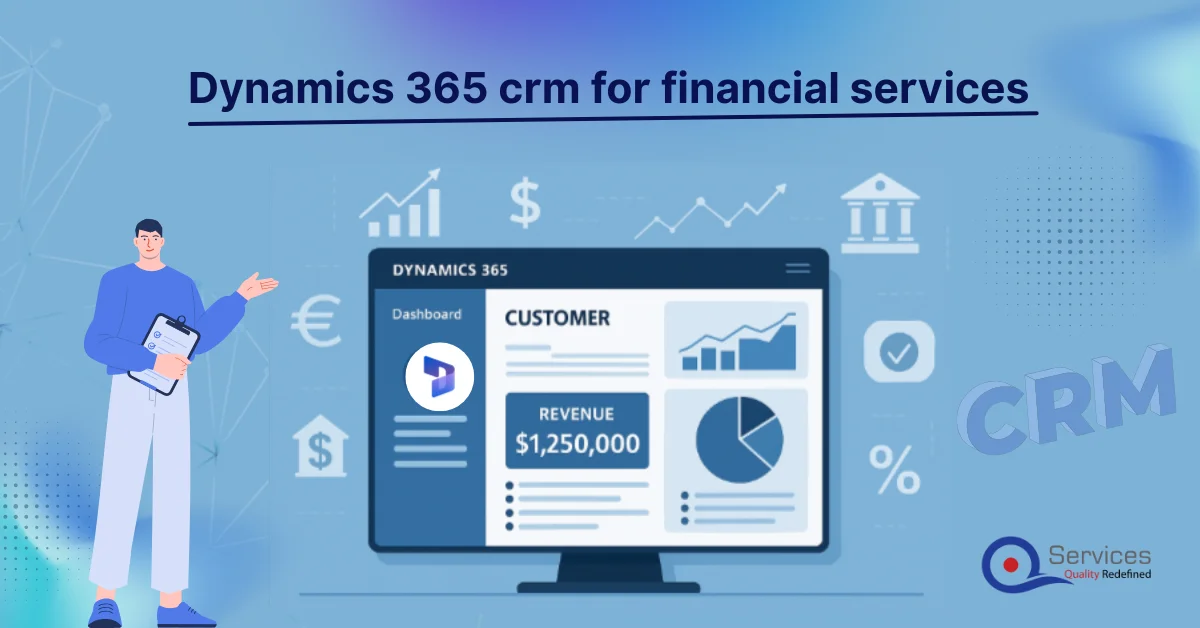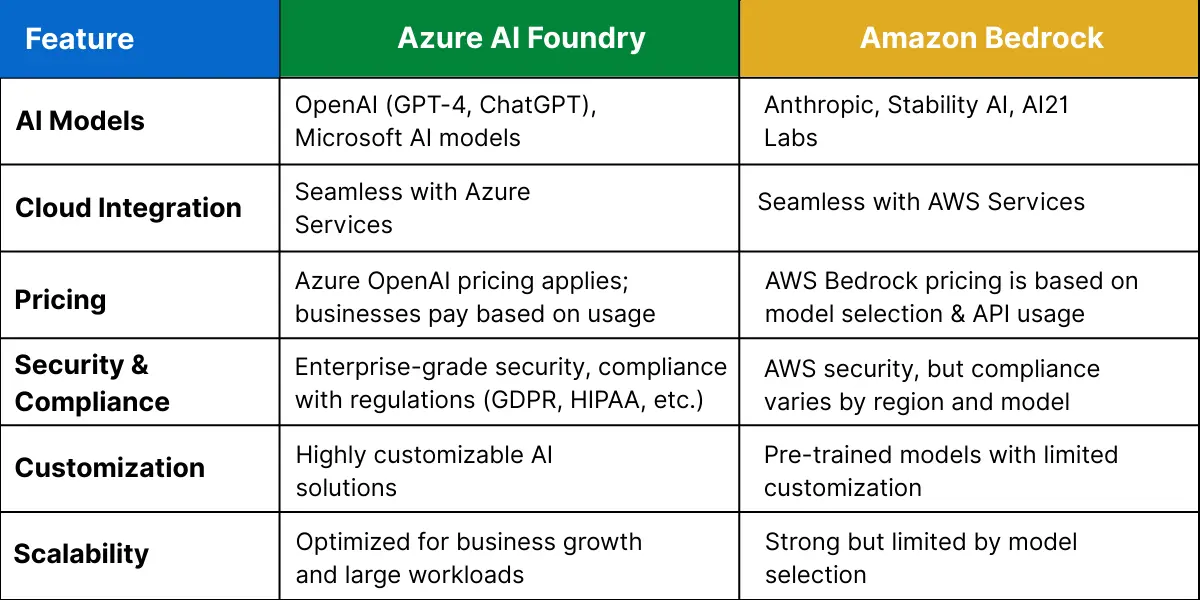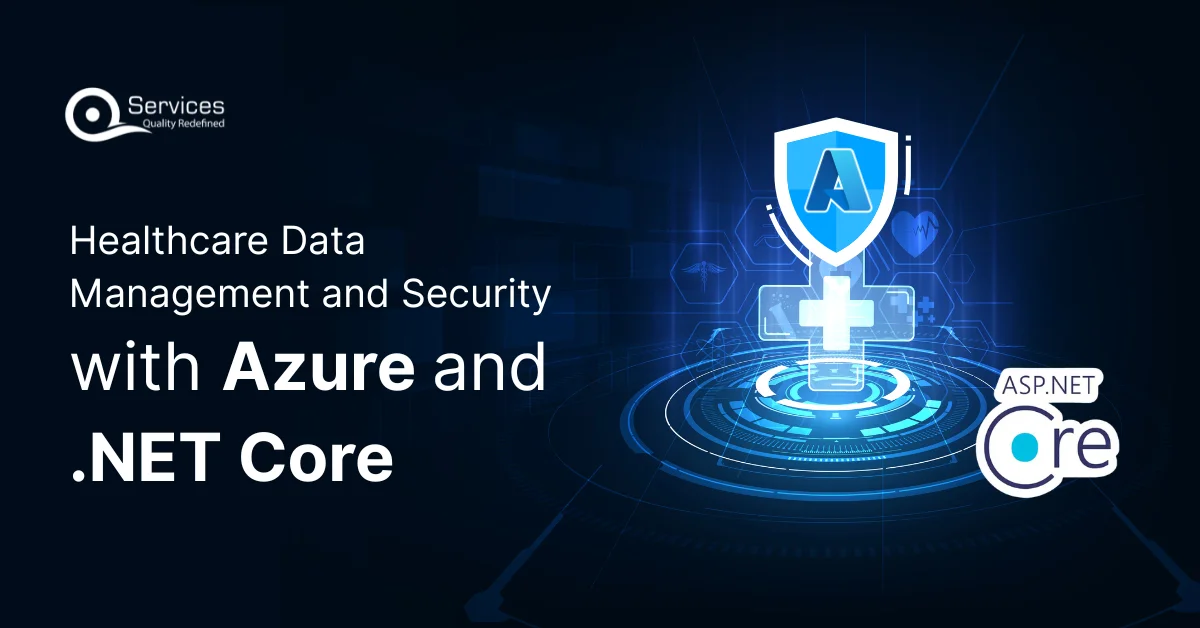
Rewards
.





CANADA
55 Village Center Place, Suite 307 Bldg 4287,
Mississauga ON L4Z 1V9, Canada
Certified Members:
.



Home » Azure AI Foundry vs. Amazon Bedrock: Which is Right for Your Business?

AI is no longer a technology of the future; it’s reshaping how businesses automate processes, improve customer engagement, and drive efficiency. With AI development platforms evolving at a fast pace, making the right choice is more important than ever.
When businesses explore AI platforms, a key question arises—Azure AI Foundry vs Amazon Bedrock: Which is better for AI solutions? Both platforms offer powerful tools, but which one aligns best with your needs?
Two major players—Azure AI Foundry and Amazon Bedrock—offer powerful AI solutions. But which one is the best fit for your business? Is AWS Bedrock pricing more cost-effective, or does Azure OpenAI pricing offer better value? How do these platforms compare in terms of scalability, features, and enterprise benefits?
In this article, we will provide you a detailed business-focused comparison of AWS Bedrock vs Azure AI Foundry highlighting their capabilities to help you choose the right AI platform.
Before we go deep into the details, let’s clarify what these platforms offer.
Azure AI Foundry is a Microsoft’s enterprise AI platform designed to integrate seamlessly with Azure OpenAI services. It provides businesses with pre-built AI models, deep integration with Azure’s cloud ecosystem with enhanced security for large-scale AI applications. Whether you’re looking for AI-powered chatbots, automation tools, or data-driven insights, Azure AI Foundry is built to handle it.
Amazon Bedrock is an AWS’s enterprise AI solution that offers pre-trained foundation models for NLP, generative AI, and automation, enabling businesses to build AI applications without handling infrastructure.
When it comes to choosing between Amazon Bedrock vs. Azure AI Foundry, businesses need to consider some most crucial features like cost, scalability, AI capabilities, and security.
When comparing Azure AI Foundry vs. Amazon Bedrock, pricing plays a major role. Businesses must consider OpenAI pricing, Bedrock cost, and Azure OpenAI cost to determine the most cost-effective solution.
Businesses are charged based on API usage, foundation model selection, and compute power. If you choose a more advanced model, costs can increase significantly.
Pricing varies based on model usage and Azure cloud consumption. However, Microsoft provides flexible pricing tiers, making it easier for enterprises to scale AI adoption without breaking the bank.
Now, we’ll take a deeper dive into the pros and cons of Azure AI Foundry vs. Amazon Bedrock, including:
Scalability is critical when selecting an AI development platform. Whether you’re a startup looking to expand or an enterprise handling massive AI workload, you need a solution that adapts to business growth.
Get free Consultation and let us know your project idea to turn into an amazing digital product.

With increasing data privacy regulations, businesses must ensure their AI solutions meet security and compliance standards. Let’s compare Azure AI Foundry vs. Amazon Bedrock in terms of security, data privacy, and compliance.
Best for businesses prioritizing security, compliance, and enterprise control.
Best for businesses already compliant with AWS security standards but may not suit industries needing high-level data control.
Security Verdict :Azure AI Foundry wins for industries requiring strict compliance and enterprise-level security.
The best way to understand the impact of Azure AI Foundry vs. Amazon Bedrock is by looking at how businesses use them.
When businesses invest in AI solutions, performance and scalability are two of the most critical factors. Whether you’re running AI-driven automation, NLP models, or large-scale generative AI applications, you need a platform that can efficiently handle workloads while maintaining cost-effectiveness.
So, how does Amazon Bedrock vs Azure AI Foundry compare in terms of speed, scalability, and performance? Let’s dive in!
Microsoft has built Azure AI Foundry to support businesses as they scale. Whether you’re a startup looking for cost-effective AI development or a large enterprise needing a fully managed AI infrastructure, Azure’s deep integration with Microsoft services makes scaling seamless.
Amazon Bedrock also provides scalable AI infrastructure, but with a more AWS-centric approach:
Pricing plays a massive role in AI adoption. Businesses don’t just need powerful AI; they need affordable AI solutions that fit their budgets.
Microsoft offers flexible pricing for AI workloads through their Azure OpenAI cost models:
Azure AI Foundry is more cost-efficient for businesses that require a Microsoft-driven AI ecosystem, whereas Amazon Bedrock is better suited for AWS-native workloads.
We’ve explored how Azure AI Foundry and Amazon Bedrock compare in terms of features, scalability, performance, and cost. But when it comes to real-world business applications, which platform delivers the best AI-driven outcomes? Let’s break it down based on key business use cases.
Enterprises leveraging Microsoft’s ecosystem—including Microsoft 365, Power BI, and Dynamics 365—will benefit from Azure AI Foundry’s native integration.
On the other hand, Amazon Bedrock is better suited for AWS-native enterprises that rely on EC2, S3, and AWS Lambda for automation.
Businesses looking to enhance customer engagement with AI-driven chatbots, like Copilot AI in Microsoft 365, will find Azure AI Foundry more effective.
Amazon Bedrock offers Anthropic Claude & AI-driven chatbots but lacks the deep Microsoft integration needed for enterprise-wide AI adoption.
Startups and developers who need multiple AI models with quick setup may prefer Amazon Bedrock due to its plug-and-play foundation models like Claude, Llama, and Stability AI.
However, Azure AI Foundry offers more enterprise-grade security and AI lifecycle management, making it a better choice for scaling AI projects in regulated industries.
Businesses leveraging data analytics, predictive modeling, and AI-driven insights will benefit from Azure’s AI ecosystem.
While Amazon Bedrock supports AI for data analytics, it lacks deep integration with enterprise-grade BI tools like Power BI, making Azure AI Foundry the stronger choice.
If you’re an enterprise or business that heavily relies on Microsoft products, AI-driven automation, and data analytics, Azure AI Foundry is the best choice. However, if you’re a startup, developer, or AWS-native business, Amazon Bedrock might be a better fit.
Share your project idea with us. Together, we’ll transform your vision into an exceptional digital product!

No matter which AI platform you choose, the future of business is AI-driven. Whether you prioritize scalability, cost, or integration, having an AI-powered business strategy is essential.
Ready to leverage AI for your business? Explore Azure AI Foundry today and unlock the next level of AI-powered innovation.
Azure AI Foundry offers a wide range of AI services, including machine learning, cognitive services, and AI infrastructure. Amazon Bedrock focuses on providing pre-trained AI models and tools for building custom AI solutions.
Both platforms offer robust integration capabilities. Azure AI Foundry integrates seamlessly with other Microsoft services, while Amazon Bedrock integrates well with AWS services.
Both platforms offer robust machine learning support, but Azure AI Foundry’s Azure Machine Learning service is highly regarded for its comprehensive features.
Azure AI Foundry provides tools for training, deploying, and managing machine learning models, including automated ML and custom model training.
Amazon Bedrock offers Amazon SageMaker, which provides a complete set of tools for building, training, and deploying machine learning models.
Azure AI Foundry offers Azure Cognitive Services for NLP, while Amazon Bedrock provides Amazon Comprehend for similar capabilities.
Both platforms offer strong computer vision capabilities. Azure AI Foundry provides Azure Computer Vision, and Amazon Bedrock offers Amazon Recognition.
Azure AI Foundry offers Azure Bot Services, which allows businesses to build, deploy, and manage intelligent chatbots.
Amazon Bedrock provides Amazon Lex for building conversational interfaces and chatbots.
Azure AI Foundry offers Azure Speech Services, while Amazon Bedrock provides Amazon Transcribe and Amazon Polly for speech recognition and synthesis.
Both platforms comply with major industry standards and regulations, including GDPR, HIPAA, and ISO certifications.
Azure AI Foundry offers various support plans, including developer, standard, professional direct, and premier support
Amazon Bedrock offers support plans such as basic, developer, business, and enterprise support.
Both platforms provide tools for deploying AI models in production environments, with options for real-time and batch processing.
Azure AI Foundry offers Azure Machine Learning for model monitoring and management, while Amazon Bedrock provides Amazon SageMaker Model Monitor.

This blog discusses how generative AI can be combined with MongoDB to turn the risk management in finance into an intelligent, streamlined, and scalable practice.

In the healthcare industry, managing and securing sensitive patient data is paramount. With the increasing adoption of cloud technologies, healthcare organizations are leveraging platforms like Microsoft Azure to store, process, and analyse healthcare data. However, with this shift comes the responsibility

The combination of Microsoft AI, Azure Health Insights, and Azure Cognitive Services is transforming healthcare by allowing smarter and efficient decision-making based on data. These technologies can fundamentally change the conventional practices of healthcare by taking new approaches to enhance
.





55 Village Center Place, Suite 307 Bldg 4287,
Mississauga ON L4Z 1V9, Canada
.




Founder and CEO

Chief Sales Officer

🎉 Thank you for your feedback! We appreciate it. 🙌